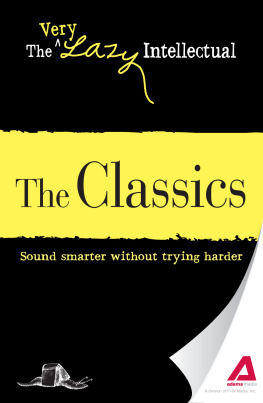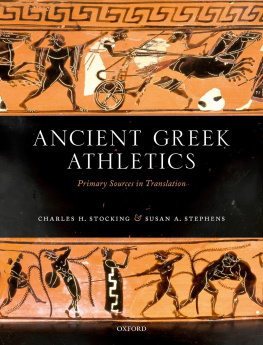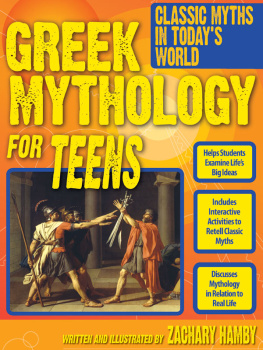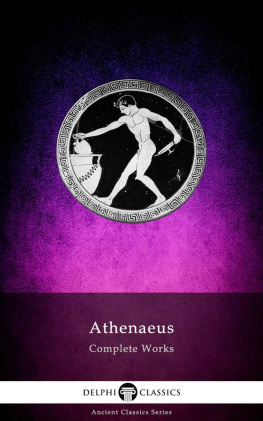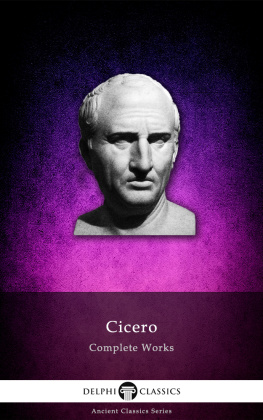Adams Media - The Classics: Sound smarter without trying harder
Here you can read online Adams Media - The Classics: Sound smarter without trying harder full text of the book (entire story) in english for free. Download pdf and epub, get meaning, cover and reviews about this ebook. year: 2012, publisher: F+W Media, genre: Religion. Description of the work, (preface) as well as reviews are available. Best literature library LitArk.com created for fans of good reading and offers a wide selection of genres:
Romance novel
Science fiction
Adventure
Detective
Science
History
Home and family
Prose
Art
Politics
Computer
Non-fiction
Religion
Business
Children
Humor
Choose a favorite category and find really read worthwhile books. Enjoy immersion in the world of imagination, feel the emotions of the characters or learn something new for yourself, make an fascinating discovery.
- Book:The Classics: Sound smarter without trying harder
- Author:
- Publisher:F+W Media
- Genre:
- Year:2012
- Rating:4 / 5
- Favourites:Add to favourites
- Your mark:
- 80
- 1
- 2
- 3
- 4
- 5
The Classics: Sound smarter without trying harder: summary, description and annotation
We offer to read an annotation, description, summary or preface (depends on what the author of the book "The Classics: Sound smarter without trying harder" wrote himself). If you haven't found the necessary information about the book — write in the comments, we will try to find it.
Cant recall anything about the ancient world? Unsure of the difference between Cronus and Saturn? Fear not! The Very Lazy Intellectual: The Classics immerses you in the culture of the ancient Greek and Roman worlds. With information on everything from architecture to mythology, youll have everything you need to be a modern-day Cicero in no time.
Adams Media: author's other books
Who wrote The Classics: Sound smarter without trying harder? Find out the surname, the name of the author of the book and a list of all author's works by series.
The Classics: Sound smarter without trying harder — read online for free the complete book (whole text) full work
Below is the text of the book, divided by pages. System saving the place of the last page read, allows you to conveniently read the book "The Classics: Sound smarter without trying harder" online for free, without having to search again every time where you left off. Put a bookmark, and you can go to the page where you finished reading at any time.
Font size:
Interval:
Bookmark:


Avon, Massachusetts
If we were to look up the term lazy in a dictionary, we might expect to find some unflattering connotations. Lets skip over such definitions as adverse or resistant to work, slothful, and sluggish, and adopt a more positive, charitable perspective. If instead we consider lazy as economical or avoiding waste, we get a much better picture of the idea behind The Very Lazy Intellectual series.
This series of books is a set of short, economical references full of the fundamental knowledge you need to know to sound as if you really know something about a particular academic subject. The Very Lazy Intellectual: The Classics lays out the indispensable facts, crucial high points, and fascinating elements of the contributions of the ancient Greek and Roman civilizations to build your knowledge foundation.
Whether you want to refresh your memory of a long-since forgotten course, or merely wish to be able to say something intelligent without having to put in a great deal of study, this book will help. Enjoy the low-effort scholarship of The Very Lazy Intellectual: The Classics .
If youd like to learn more about the classics or more, check out The Lazy Intellectual , available in print (978-1-4405-0456-3) and eBook (978-1-4405-0888-2) formats.
The classical period of Greek history began in 499 B.C. with the revolt of the Ionian cities on the coast of Asia Minor. The Persians, who controlled the region, defeated the rebels and attacked Athens and Sparta. Athens defeated the Persians at Marathon in 490 B.C. , but in 486 the Persians again attacked Athens with a huge armed force and destroyed the city. The Athenians, aided by Sparta, followed and defeated the Persians at Plataea.
In 477 B.C. , the Ionian and Aegean cities united with Athens to form the Delian League in defense against the Persians. Athens became the military center of this alliance in 454 and, under the rule of Pericles, started to rebuild the city. Despite the partnership between Athens and Sparta against the Persians, tensions grew between the two city-states, leading to the Peloponnesian War in 431 B.C.
The Peloponnesian War, which lasted twenty-seven years from 431 to 404 B.C. , involved much of the Mediterranean world. The immediate cause of the war is generally considered to be Spartas unease with the growing power of Athens, driven by Pericless expansion of the Athenian navy. Pericles also built alliances with other city-states that were in opposition to Spartas Peloponnesian League members.
Athens fought a defensive war until Pericless death in 429 B.C. , but after 427 they adopted more offensive strategies. These new assaults were not successful and led to the institution of a truce. The peace was unsatisfactory, and war engulfed the entire region by 418. Sparta held greater resources and understood correctly that Athens could be defeated through economic starvation. Athens surrendered in 404 B.C.
Defining Moment
Sparta attacked Athens in 431 B.C. , while the latter was involved with a blockade of Potidaea, a city that had revolted against Athenss rule.
The rise to power of Sparta and the invasion of Greek cities by Philip of Macedon in the 350s B.C. marked the end of the Classical Period and the start of the Hellenistic Period.
Greece was a collection of city-states with different forms of government during the Greek Classical Period (500323 B.C. ), with Athens dominant. It was a period of great social and political upheaval, as Athens, Sparta, and other members of the Delian League waged war against the Persians, and then with each other in the Peloponnesian War.
The first democratic system of government was instituted during this period. In 510 B.C. , Cleisthenes, an aristocrat, challenged and overthrew the rule of Hippias, a brutal Athenian tyrant. He promised citizens the opportunity to participate in government through the power of voting. He in turn was challenged and had to flee the city but later returned from exile and formed a government of representation for citizens and participation by different strata of society.
Repeatable Quotable
If liberty and equality, as is thought by some, are chiefly to be found in democracy, they will be best attained when all persons alike share in the government to the utmost. Aristotle
The Classical Period saw the development of drama as a genre through the works of Euripides, Aeschylus, and Sophocles. Before this time, drama was an elaborate dance. Under the combined influence of these playwrights, additional actors were introduced who served to enrich the stories and involve the audiences more fully.
In this period, Greek philosophers introduced the idea that rational thinking took precedence over divine influence and people were in control of their own destinies. Socrates, Plato, and Aristotle, who formed the basis of Western philosophical thought, were all active during this period. Art and architecture also saw great advances during the Classical Period. Architecture branched into separate and distinct forms and saw expression in magnificent civic buildings.
The earliest evidence of habitation in the area of Rome dates from about 1500 B.C. This area was occupied by Italic peoples, the Latins and the Sabines, as well as the Etruscans to the north and west of the Tiber River. According to legend, Rome was founded in 753 B.C. by twin brothers Romulus and Remus. Romulus murdered his brother and became the first king of Rome. The Etruscans succeeded the Latins as rulers of the city until they were overthrown and the Roman republic was established near 500 B.C.
The republic replaced the king with a senate controlled by the patrician class and gave some powers to the general population (plebians). After a taste of power, the majority agitated for more, creating great strain between the classes. In 450 B.C. , plebians were able to formalize laws in writing, called the Twelve Tables. Even though they were able to obtain greater control, contrasts between the rich and poor continued to cause friction.
By the fourth century B.C. , Rome had come into contact with Greek culture and extended its influence in much of the surrounding area. The Romans fought the Etruscans for control of the Tiber during this time and, due in part to the Etruscan conflict with Greece as well as the encroachment by the Gauls, Rome was able to overcome the Etruscan influence. However, the Gauls sacked Rome in 390 B.C. and only left after the remaining Romans were forced to pay a humiliating bribe. Picking up where they had left off, Rome reestablished its dominion over territories in central and southern Italy and set its sights seaward.
By 264 B.C. , the first of three Punic Wars pitting Rome against Carthage had started. By the end of the Third Punic War in 146 B.C. , Carthage had been destroyed, and Rome had gained control over Spain, Sicily, Sardinia, Corsica, and the northern shores of Africa; the city-state became the greatest power west of China. This did not stop their conquests however, and the Greeks became subject to Rome at about the same time while Egypt acknowledged their subordination in 168 B.C.
Font size:
Interval:
Bookmark:
Similar books «The Classics: Sound smarter without trying harder»
Look at similar books to The Classics: Sound smarter without trying harder. We have selected literature similar in name and meaning in the hope of providing readers with more options to find new, interesting, not yet read works.
Discussion, reviews of the book The Classics: Sound smarter without trying harder and just readers' own opinions. Leave your comments, write what you think about the work, its meaning or the main characters. Specify what exactly you liked and what you didn't like, and why you think so.

